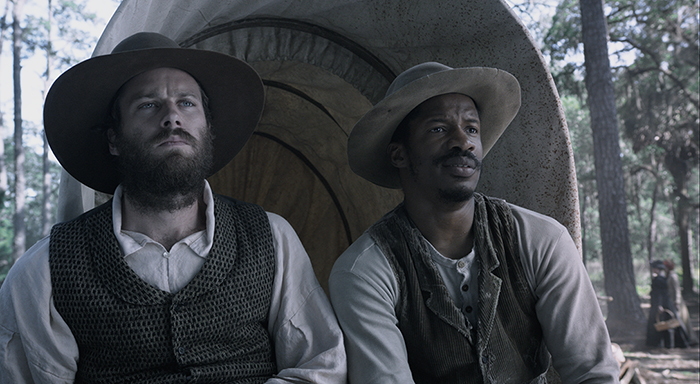
- Festivals
Sundance Review: The Birth of a Nation Addresses Old, Current Wounds
The Birth of a Nation. Directed by Nate Parker. Written by Jean McGianni Celestin and Nate Parker (story) and Nate Parker (screenplay). Main cast: Nate Parker, Armie Hammer, Gabrielle Union, Aunjanue Ellis, Aja Naomi King, Penelope Ann Miller, Jackie Earle Haley. U.S., 2016.
I could not have been older than nine or ten when I watched the original The Birth of a Nation on my parents’ small TV. Way too young and too foreign to grasp the story or its meaning. So I went into the Sundance screening of Nate Parker’s film with no recollection of the 1915 film, and no knowledge of the true story that both pictures are based on. It is not an easy film to watch nor is it meant to be. You feel uncomfortable no matter if you are black or white, Christian or Muslim or Hindu or Jewish or without any particular religious affiliation, as the man next to me commented at the end of the film. I went through a mixture of emotions – a feeling that, quite likely, I share with most of the audience.
Let me start with the cinematic: the film is beautifully shot and a testament to a huge emerging talent, director Nate Parker. Parker is also Birth’s lead actor, playing Nat Turner, a slave turned preacher turned revolutionary who led a liberation movement in 1831 to free African-Americans in Virginia, resulting in a brutal retaliation from whites. As an actor Parker is easy on the eyes and I had visions of a young Denzel Washington. Having researched, co-written and co-produced his passion project for seven years, you just know he got every detail right. From the costumes to the locations and the uncovering of stories that, in his own words, were whitewashed in D. W. Griffith’s and other films. The casting is impeccable with Aja Naomi King as Nat’s wife Sherry, Aunjanue Ellis as his mother Nancy, Armie Hammer as plantation and slave owner Samuel Turner and Penelope Ann Miller as Samuel’s gentle-hearted mother who teaches a young Nat to read – which was illegal at that time.
The film depicts American history from almost 200 years ago but it seems to me more than relevant for this country right now. Race issues may not be fought for with knives, axes and guns but rather with hashtags in social media, such as #BlackLivesMatter. But this doesn’t mean they do not exist. When a white master raises his stick against Nat who just tries to hand his child the doll he had dropped, I thought of the many police shootings we witnessed just in the last year.
What struck me most, however, was the delicacy in which Parker showed or rather hinted at the violence female slaves had to endure. Yes, there are scenes where I had to avert my eyes, one in particular, when a man has his teeth kicked in with a hammer and is then force-fed while shackled in a barn. And there is Nat’s own whipping that made me cringe. But unlike most other films I have seen with themes of slavery – a multi-award winning one among them – the pain women suffered at the hands of slave masters was never exploitive but rather subtly hinted at. Which does not mean that it had less of an impact.
Overall I know The Birth of a Nation will stay with me for a while and it should. The parallels drawn between then and now may give many of us pause for thought.
(Read our interview with Nate Parker herehere how his film broke a Sundance record or listen to our interview with Nate Parker here.)
Elisabeth Sereda